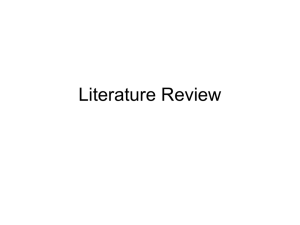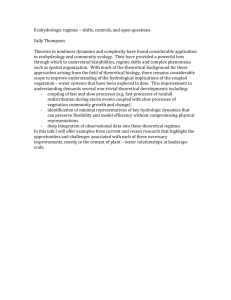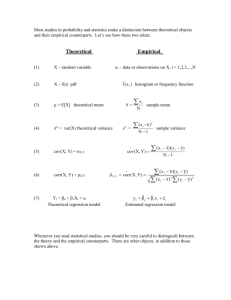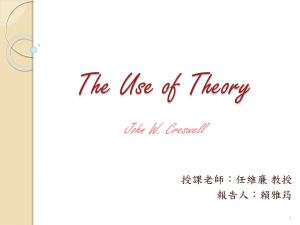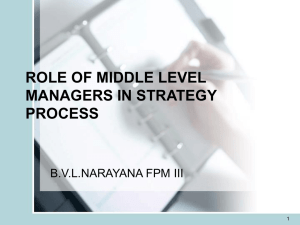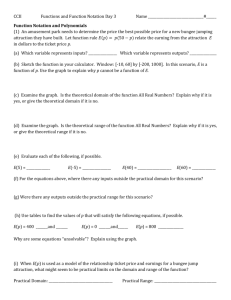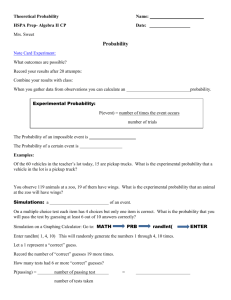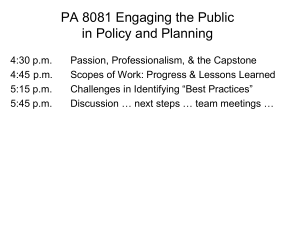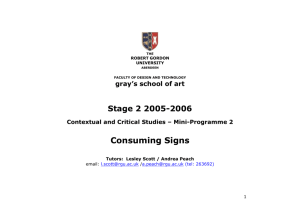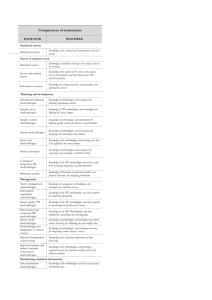ARF601
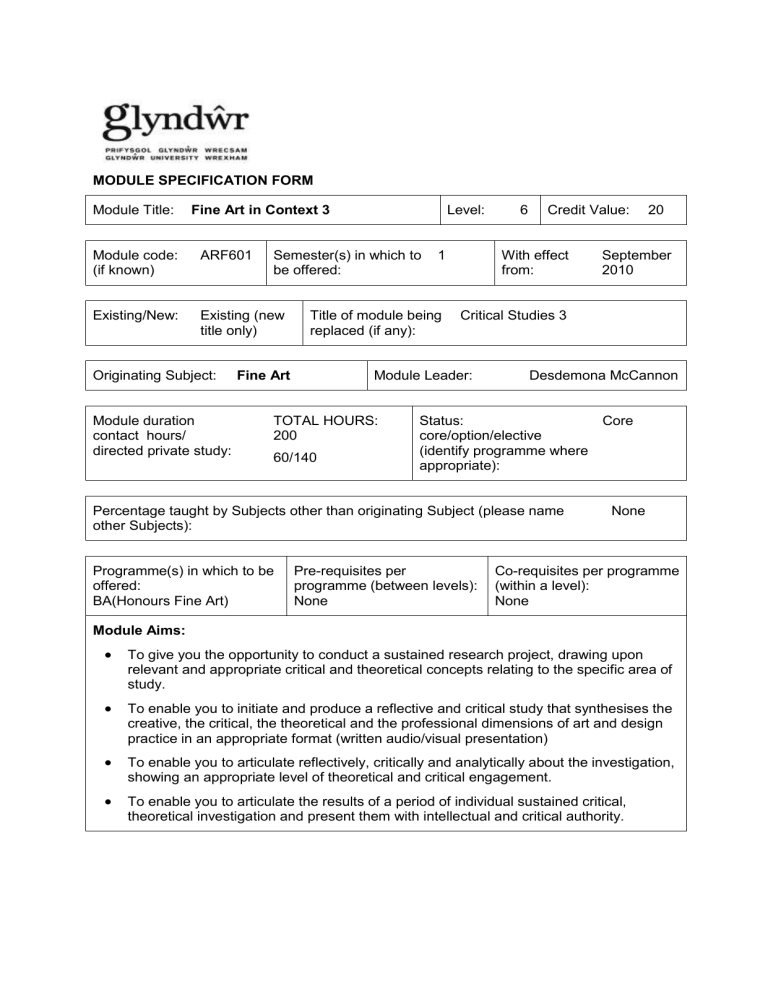
MODULE SPECIFICATION FORM
Module Title: Fine Art in Context 3
Module code:
(if known)
ARF601 Semester(s) in which to be offered:
1
Level: 6 Credit Value:
With effect from:
Title of module being replaced (if any):
Critical Studies 3
September
2010
20
Existing/New: Existing (new title only)
Originating Subject: Fine Art Module Leader: Desdemona McCannon
Module duration contact hours/ directed private study:
TOTAL HOURS:
200
60/140
Status: core/option/elective
(identify programme where appropriate):
Core
Percentage taught by Subjects other than originating Subject (please name other Subjects):
Programme(s) in which to be offered:
BA(Honours Fine Art)
Pre-requisites per programme (between levels):
None
None
Co-requisites per programme
(within a level):
None
Module Aims:
To give you the opportunity to conduct a sustained research project, drawing upon relevant and appropriate critical and theoretical concepts relating to the specific area of study.
To enable you to initiate and produce a reflective and critical study that synthesises the creative, the critical, the theoretical and the professional dimensions of art and design practice in an appropriate format (written audio/visual presentation)
To enable you to articulate reflectively, critically and analytically about the investigation, showing an appropriate level of theoretical and critical engagement.
To enable you to articulate the results of a period of individual sustained critical, theoretical investigation and present them with intellectual and critical authority.
Expected Learning Outcomes:
At the end of this module, students should be able to:
1. Demonstrate that they have acquired knowledge to a considerable depth in a subject of their choice.
2. Demonstrate the ability to conduct independent personal research, and identify appropriate research methodologies and conduct personal research to a high level of competence.
3. Demonstrate to a high level of competence, independent thought, usage of analytical skills and the capacity to produce a well reasoned argument.
4. Demonstrate an ability to critical evaluate a range of critical, theoretical and contextual material.
5. Demonstrate that they can achieve professional standard with regard to presentation skills.
6. Produce a research project which responds to one of the options given which represents an appropriate breath of relevant material and an understanding of the subject area.
Transferable/Key Skills and other attributes:
Able initiate, plan and manage projects.
Ability to identify implement research and management strategies
Ability solve problems
Adapt creative solutions to new situations
Assessment:
Key criteria with regard to the assessment of this module will be; research skills, analytical skills, capacity for reasoned argument, and organisational skills. You will be required to complete a piece of sustained critical and analytical research relating to your chosen area of investigation; which provides the opportunity to inform your personal studio activity and lead to self awareness. The body of work will show a critical understanding of the subject and indicate a level of independent evaluation and contextual debate. Clear research methodologies and strategies will be indicated and applied to the critical, theoretical and visual analysis of the body of work, or individual artworks under investigation.
100% Research Project – examples include:
‘The Imaginary Museum’ – illustrated catalogue and catalogue essay for an ‘imagined’ student-curated gallery show or installation (plus research folder) or
1 hour presentation (plus research folder) or
5,000 word dissertation or
2,500 word essay & 30 minute presentation (plus research folder)
Assessment Learning
Outcomes
To be met
Type of assessment
Weighting Duration (if exam)
Word count or equivalent if appropriate
1 All (1-6) Course work 100% continuous Refer to indicative assessment tasks
(above).
Learning and Teaching Strategies:
The work for this module will be largely self-directed with regular tutorial support. Group tutorials will be given and refresher courses in IT, presentation and research skills will be delivered. There will be individual guidance where students will present samples of work in progress to staff and progressive stages of work will be agreed.
Syllabus outline:
Rationale:
This module will provide you the opportunity for you to benefit from an extended period of independent research and critical study identified and agreed upon at Level 2. The content of this offers the opportunities to support and inform studio practice set against the wider context of art and design practice. You will be expected to show an understanding and awareness of the subject, identify, discuss and analyse appropriate materials relevant to the subject of study. You will need to be able to demonstrate the capacity to sustain a range of intellectual and practical skills commensurate and expectations for this level of study.
Indicative Content:
The content of this module will be defined by the Level 2 proposal which defines the specific aims, rationale, and methodologies of the programme of work. These will be negotiated and agreed prior to the end of level 2, a review of the proposal at the commencement of Level 3 will assist in reconfirming the focus and direction of the programme of study.
Bibliography :
Indicative Reading:
Barnet, Sylvan (2005) A Short Guide to Writing About Art London: Longman
Barrett, Terry (1990 rp 1996) “Theory is it Art?” in Criticizing Photographs: An Introduction to
Understanding Images 2nd edition Mountain Vew, California: Mayfield Publishing pp.132-156
Crow, David (2003) Visible Signs: An Introduction to Semiotics, London: Ava Publishing
Frederickson and Webb, Sarah E. (eds) (2003) Singular Women: Writing the Artist
(Ahmanson-Murphy Fine Arts Book S.) Kristen, University of California Press
Hall, Stuart (1997) Representation : Cultural Representations and Signifying Practices
London: Sage Publications
Harris, Roy (2003) The Necessity of Artspeak: The Language of Arts in the Western
Tradition, Continuum International Publishing Group – Academi
Kress, Gunther, Theo Van Leeuwen (eds) (2004) Reading Images: The Grammar of Visual
Design (2nd ed) London: Routledge
Sturken, Marita and Lisa Cartwright (2000) Practices of Looking: An Introduction to Visual
Culture Oxford: Oxford University Press
Mirzoeff, Nicholas (ed) (2002) The Visual Culture Reader (2nd ed) London: Routledge
Murray, Chris (ed) (2002) Key Writers on Art: the Twentieth Century London: Routledge
Nelson, Robert, S. and Richard Shiff (2003) Critical Terms for Art History: Chicago: Chicago
University Press
Noble, Ian and Bestley, Russell (2005) Visual Research: An Introduction to Research
Methodologies in Graphic Design London: Ava Publishing
Rose, Gillian (2001) Visual methodologies: an introduction to the interpretation of visual materials, London: Sage Publications
Sontag, Susan (1964) “Against Interpretation” in Fernie, Eric (1995 rp 1999) Art History and its methods: A Critical Introduction London: Phiadon pp214-222
Sullivan, Graeme (2005) Art Practice as Research: Inquiry in the Visual Arts London: Sage
Publications
Upton, Ellen and Abbot Miller (1999) Design Writing Research, London: Phaidon
Van Leeuwen, Theo, Carey Jewitt (eds) A Handbook of Visual Analysis, London: Sage
Publications
Online Sources
Working papers in Art & Design: http://www.herts.ac.uk/artdes1/research/papers/wpades/index.html
Semiotics for Beginners by Daniel Chandler: http://www.aber.ac.uk/media/Documents/S4B/semiotic.html
Moriarty, Sandra (1995) Visual Semiotics and the production of meaning in Advertising: http://spot.colorado.edu/~moriarts/vissemiotics.html
Moving History: A guide to UK film and Television archive in the public sector http://www.movinghistory.ac.uk/
International Dada Archive: http://www.lib.uiowa.edu/dada/
TRACY Contemporary Drawing Research http://www.lboro.ac.uk/departments/ac/tracey/
Working papers in Art & Design: http://www.herts.ac.uk/artdes1/research/papers/wpades/index.html
http://trace.ntu.ac.uk/index.cfm
http://fineart.ac.uk/ http://vads.ahds.ac.uk/collections/index.html
http://www.csc.ucreative.ac.uk/ http://web.ukonline.co.uk/n.paradoxa/ http://www.ubu.com/
